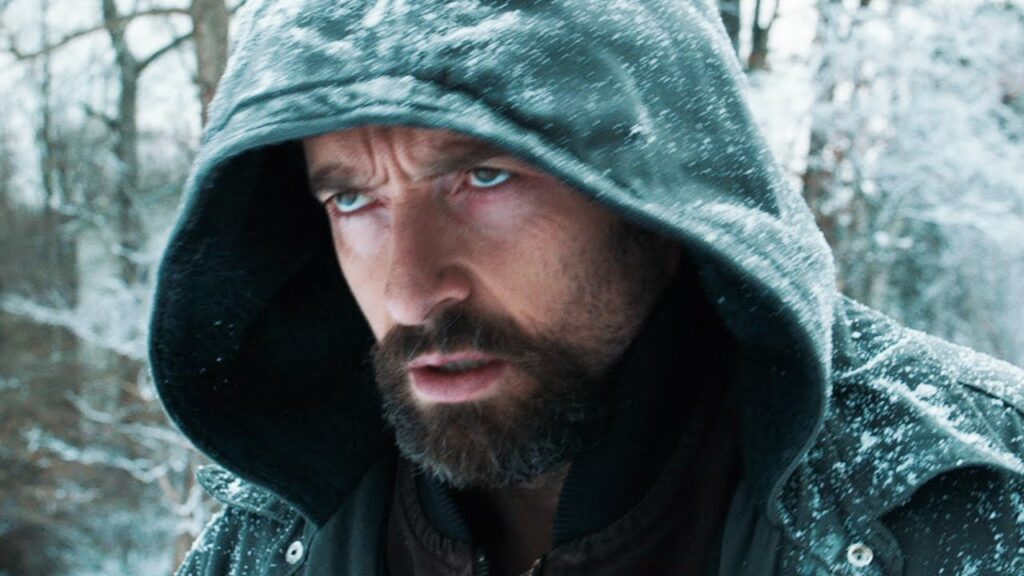By Armond White
Two films on faith this week are not a coincidental appearance. They suggest a transition in culture from the prevailing agnosticism to spiritual awareness. One film is masterly, the other fumbling.
In Denis Villeneuve’s Prisoners, Keller Dover is a modern man possessed of Biblical rage when his six-year-old daughter and a neighbor’s child are kidnapped. Dover (played by Hugh Jackman) is one of those Americans President Obama labeled as “clinging to their guns and religion.” He loves to hunt, craft and is caught up in the difficulty of providing for a family in this current economic downturn.
 The crisis that befalls him on Thanksgiving Day is distractingly similar to the Red State/ Blue State divisiveness that has overrun American movies for the past 10 years but Prisoners goes deeper than that. When Dover captures the suspected kidnapper (Paul Dano), holds him hostage and tortures him with the aid of the other grieving father, Franklin (Terrence Howard), the film goes deeper still–past facile Guantanamo allegories to conflicting impulses of anger, justice and faith. Such complexity makes Prisoners more than a thriller; it’s an imperfectly structured, nearly great thriller-in-transition.
The crisis that befalls him on Thanksgiving Day is distractingly similar to the Red State/ Blue State divisiveness that has overrun American movies for the past 10 years but Prisoners goes deeper than that. When Dover captures the suspected kidnapper (Paul Dano), holds him hostage and tortures him with the aid of the other grieving father, Franklin (Terrence Howard), the film goes deeper still–past facile Guantanamo allegories to conflicting impulses of anger, justice and faith. Such complexity makes Prisoners more than a thriller; it’s an imperfectly structured, nearly great thriller-in-transition.
C.O.G. is not great. Its story about a young gay man concerns his crisis of faith (he’s one of those Obama labeled as worthy) but this is only a faddish schema that combines sexual guilt and cultural arrogance into an identity politics cabaret (starting with the most repugnant and maudlin opening scene in years). The film’s title acronym means “Child of God”–a facile irony deriding those Christians trying to convert clever gay atheist Samuel (played by Jonathan Groff) who has unaccountably run from his Yalie background. Yet his skeptical encounters in guns-and-religion country ring false. Director Kyle Patrick Alvarez, working from an essay by the voguish David Sedaris, pretends taking religion and atheism seriously, yet C.O.G. is a la mode–geared to and stemming from mainstream media bias that traps contemporary gay politics in superficial opposition to Christianity. Lockstep Liberalism.
Villeneuve dares examine the profundity of Christian faith through Dover’s actions. Prisoners tests law and lawlessness (Dover’s antagonist is police detective Loki played by Jake Gyllenhaal) while dramatizing earthly horror, daily desperation and hope vs. hopelessness. It is an adult correction of the fateful dread in The Place Beyond the Pines and that David Fincher exploited in Zodiac. Villeneuve transitions genre formula to a level of philosophical (not political) concentration. Dover’s anger errors are moving. Samuel’s sniveling, cowardly superiority are not.
Prisoners considers mankind’s emotional traps–the mistakes that result from the neediest intentions. Bringing this to bear on genre formula, Villeneuve’s long, crisscrossing story acquires discomforting power–whereas C.O.G.’s mechanical, religious trifling becomes obvious and offensive. Samuel’s contempt for working-class believers is matched only by Alvarez’s petty characterizations: grim, hostile, idiotic zealots who resent Samuel’s apparent gayness and freedom and respond to it spitefully. Each is a lamestream media cliché (as is Groff’s gee-whiz saintliness) while Villanueve dares push Dover toward villainy. The deeper Dover sinks into his own angry righteousness and white privilege, the more pitiable he becomes.
Villeneuve and screenwriter Aaron Guzikowski aren’t easy on Christianity. Dover says the Lord’s Prayer when stalking deer and the creepiest characters recite homey platitudes. The pop chestnut “Put your hand in the hand of the man who stills the waters…” makes for an eerie motif. But the rejoinder to that lyric “Take a look at yourself and you may look at others differently” suggests an extraordinary view of our twisted spirituality, beyond Hollywood’s usual good-vs.-evil conflicts. An amazing, accidental Confessional scene flips any preconceived notion of piety. And Villeneuve strips his actors to desperation: Jackman’s devastated holy man lacks Mel Gibson’s old charm yet recalls George C. Scott’s intractable Old Abraham in John Huston’s The Bible. Gyllenhaal abandons his haughtiness in Zodiac; here his faith is tested yet dogged. When a co-worker dismisses a clue, Loki insists “Everything matters.” That’s Villeneuve’s credo.
Prisoners transforms the hackneyed revenge drama, though without the familiar satisfactions. Anyone who saw Villeneuve’s 2011 Incendies, the modern epic connecting the war in Lebanon to the generational crisis of a Canadian (i.e., American) family, will recognize his interest in moral complexity but be surprised by it in this context.
Over the past decade we’ve come to expect cynical, despairing films about our spiritual crises. (That’s Alvarez’s ultimate failure in C.O.G.; he’s lost the sensitivity of his debut Easier With Practice. Leaving smug Samuel to wander on a lonely road accepts nihilism. It’s the piety of “progressive” politics.) But Villeneuve’s focus on everyday anxiety–on the specter of godlessness–allows him to reconcile despair with his distinctively solemn perception of phenomenal, unfathomable life. Prisoners isn’t frothy spirituality or feel-good politics; it’s tough–and its transitional hope cannot be dismissed.
Follow Armond White on Twitter at 3xchair
